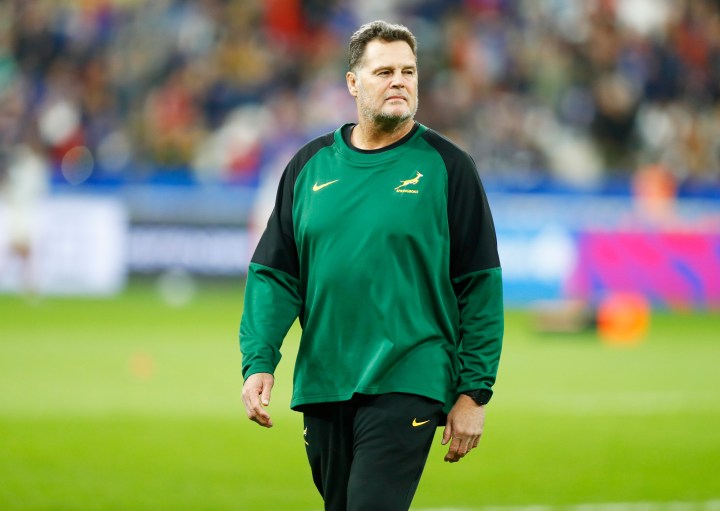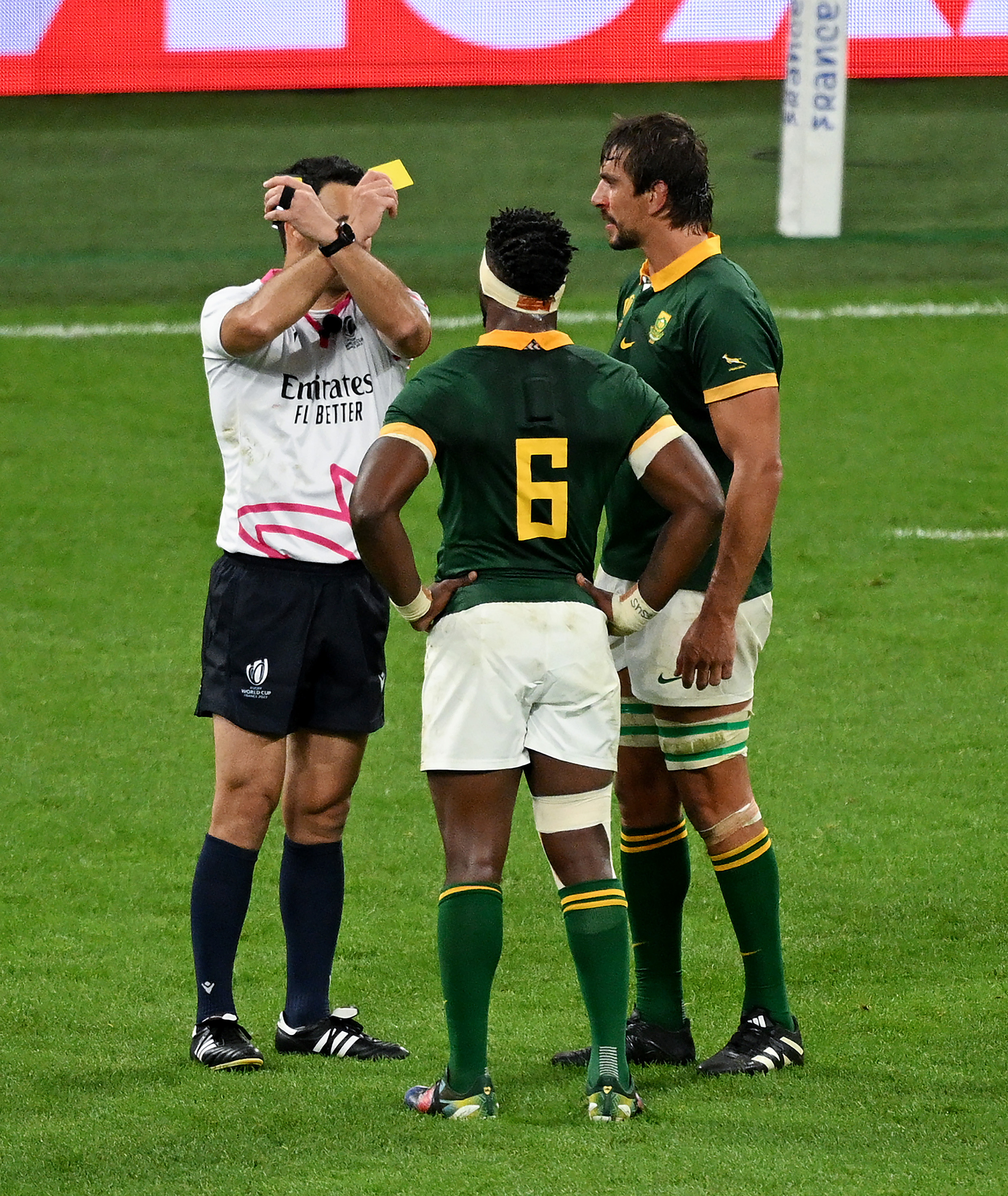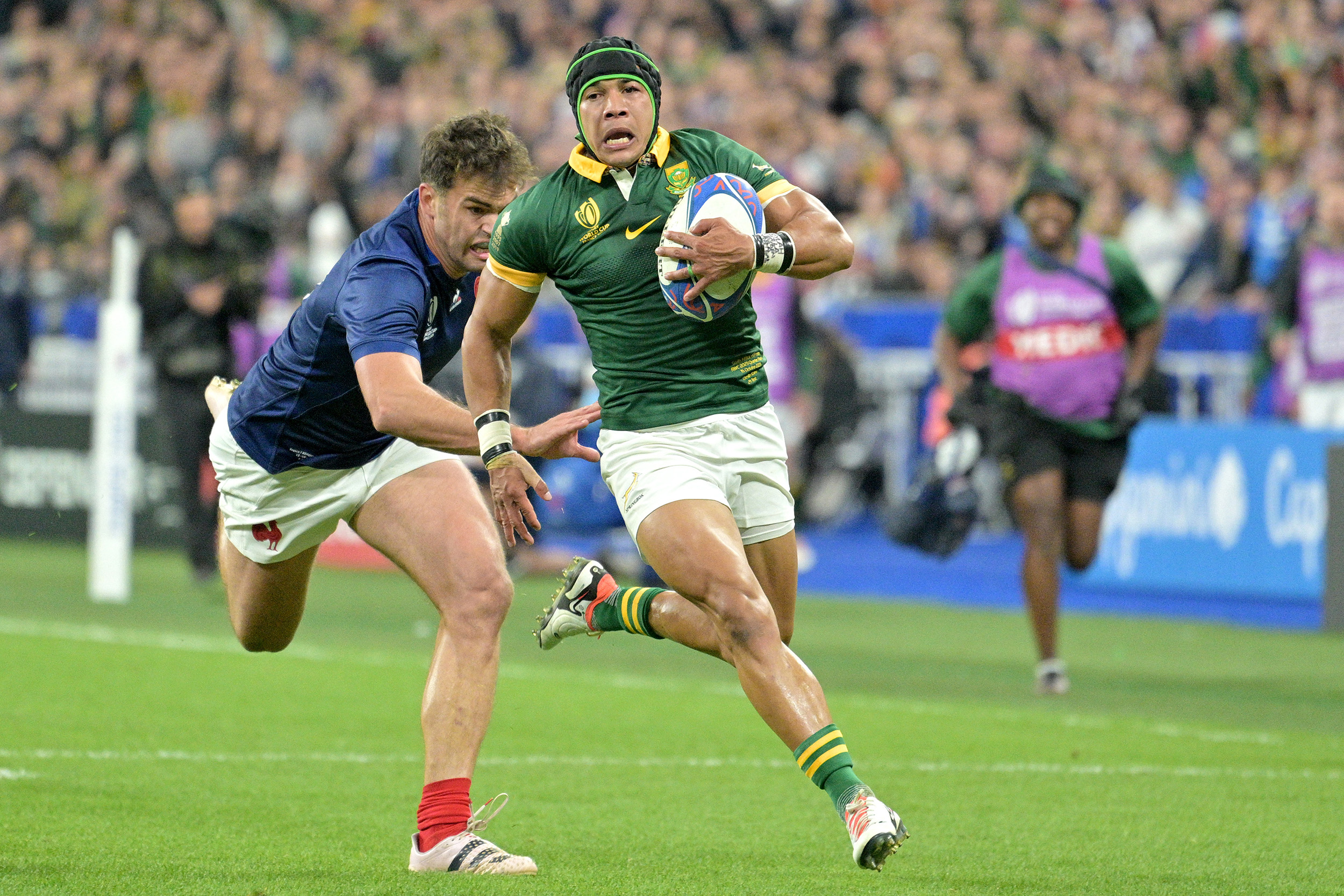RWC 2023
Rassie’s ref olive branch, Boks’ tweaked game flow approach may have tipped balance against France

A change in mindset to their approach to referees might have been the crucial difference when the Boks beat Franc 29-28 in a fantastic Rugby World Cup quarterfinal at Stade de France on Sunday.
There is no definitive way of knowing if Springbok director of rugby Rassie Erasmus’ contrition over the lack of respect he showed referees previously had an influence on the outcome of Sunday’s brilliant quarterfinal against France. It might have.
But the fact that the rugby world is calling it one of the best games ever, suggests that referee Ben O’Keeffe had a good game. He wasn’t the defining factor in the outcome — at least to most observers outside France.
Incidentally, O’Keeffe will handle Saturday’s semi-final between the Boks and England as well. Australian Angus Gardner will take charge of the All Blacks against Argentina.
After last November’s Northern Hemisphere tour, the Springboks made a collective decision that they (well, Rassie really) would show match officials respect regardless of the outcome of matches. In future, they offer nothing but respect to officials even if they believe them to be wrong.
Problems and questions would only be raised in private and through formal channels. The change of mindset might have had benefits when it came to 50/50 calls on the field but in reality, the biggest benefit was to Springbok players themselves.
They’ve shed the victim mentality. They’ve moved away from finding fault with the refs and it’s been liberating. Players have been emboldened to play hard and on the edge without worrying about decisions. It’s cathartic because they spend more energy on doing their jobs and less worrying about the officials.
By contrast French players and the understandably myopic crowd at Stade de France were at referee O’Keeffe all night as the Boks edged Les Bleus 29-28 in a fantastic game.
Read more in Daily Maverick: Narrowest of margins: Brutal Boks find a way to edge Les Bleus in Paris quarterfinal thriller
French players regularly gave O’Keeffe a mouthful and while some tight calls might have gone against them, the same could be said the other way.
France captain Antoine Dupont was critical of O’Keeffe after his side lost, saying he wasn’t up to the task.
“I’m not sure the refereeing was at the level of what was at stake,” Dupont said.
“There are few clear things where the whistle could’ve blown. We could’ve had some crucial penalties, but I don’t want to be a bad loser.” Which is precisely what he was being, although it was said in the aftermath of mammoth disappointment.

Eben Etzebeth of South Africa is shown a yellow card by referee Ben O’Keeffe and he signals a TMO Bunker Review. (Photo: Hannah Peters/Getty Images)
Difficult job
Rugby played at this level, between sides that are so closely matched, will always have some marginal calls.
The laws themselves are almost impossible to apply with consistency. For example, there are more than 20 possible infringements at every breakdown and there are literally hundreds of dynamic events in a match. A referee has to make decisions on all of those in a split second.
That’s not to say they get everything right, but that they are trying to do an almost impossible job, as accurately as possible.
And they are humans. People don’t like being shouted at, they don’t like having their mistakes pointed out and they certainly don’t like being castigated in the media.
Read more in Daily Maverick: Rugby World Cup News Hub
The Boks, well Erasmus, did that for a time. He was suspended and punished and perhaps his team was too. The change of heart and approach might also have been the vital edge the Boks needed on Sunday night, as France discovered to their great cost.
It’s a lesson Dupont will have to learn as well.

Bok wing Cheslin Kolbe beats France’s Damian Penaud to score the Springbok’s third try in the quarterfinal, underlining the Boks’ new attacking mindset. (Photo: Lionel Hahn/Getty Images)
Change of approach
“Our whole motto has been, ‘let’s respect the referees’. It works both ways,” Erasmus said the day after Sunday’s gruelling win.
“He’s going to make mistakes and we’re going to make mistakes. And the frustration we had in the past, and the lack of communication because of various things with Covid … that is in the past. There’s a nice protocol in place, it’s easy to communicate with them.
“I wouldn’t like to comment on what they (France) said about the referee (after in the quarterfinal). We are just working on accepting that there will be mistakes on both sides, which is something that we had to get right and we had to earn the respect back and I think it’s slowly happening.”
The Boks not only changed their attitude to refereeing mistakes, they also considered how they could play in a way to make the official’s jobs easier.
It’s brilliant logic.
The Boks expanded their game, gave the referees more ‘pictures’ to consider. It widened the focus and perception of South Africa’s style. In short, they sent a message to referees that they’re not only a scrumming and mauling team.
By definition, a referee who sees a scrum or a lineout simply as a starter play, is less likely to give the Boks leeway in those areas. He wants the game to flow, and the Boks grinding out scrums and mauls creates a picture in his mind of a ‘negative’ team.
So, the Boks changed their game to adapt to referees.
“To be honest with you and I am serious when I say this, I will never forget that post that last French game (November 2022), I tweeted several times and a lot of people said it was controversial,” Erasmus said this week.
“But I can remember my caption there was ‘we will have to adapt and make things clearer for referees, we can’t just rely on mauling, scrumming and close-contact work where it is very difficult for the referee to make the correct decision’.
“It’s very dynamic and it’s busy and there are grey areas there.
“So, we had to adapt. Also, we had to attempt to score more tries through open, fluent, running rugby. And you could see in our try-scoring tally there’s a lot scored by our backs. More than our forwards.
“If you only rely on a certain aspect of the game which is very tough for the referee to referee and he gets two (decisions) wrong but you only relying on those three or four or five opportunities that you get, 50% of your opportunities are gone.
“But if you fire shots in open play, general play from the top of lineouts or counter-attack, it’s clearer decisions for the referee and easier to make.
“As a team, we don’t want to be this wonderful playing rugby team that the whole world loves, but we do want to score tries.
“We have changed our whole approach. We conceded six penalties (against France).
“Since we’ve changed our way, no matter if we are correct and the referees are wrong, respect must always be shown.”
France might want to heed Erasmus’ lesson because it was hard-earned. DM

















That’s really interesting. So the reason the Boks have started to play more expansively has been to make the ref’s job easier – or to make it harder for refs to keep making bad calls against them. If true, this is yet more out of the box thinking. Either way it’s truly fantastic to finally see Bok backs being allowed to show their talent in ways other than defense alone.
“There’s a nice protocol in place, it’s easy to communicate with them.”
And isn’t that a result of the Rassie video? He did world rugby a favour – but paid the price – for that (secret or not!) exposure of the arrogant refs who seem to have improved a heck of a lot.
Isn’t there a life lesson there somewhere? ??! Craig, u have made this team and the game they play come alive with your reporting the last while. Pls compile it all in a book of sorts some time … Looking forward to MORE. And HUGE respect to the Springboks. U inspire in so many ways!
It’s a good take with lots of lessons in it. I saw two other rather unusual things in this one point game. Sir Kolbe blocking a sure two points, and Manie calling a scrum instead of taking the mark conventionally. It confused the French momentarily and lead to a much better 22m exit. Crucial in the match. Well done to the squad for some really innovative work and a great win.
Don’t want to be picky, but I guess a ref might see it as such. It was Damian that made the mark/scrum call, not Manie. I believe he was off by then.¯\_(ツ)_/¯
No, it was Rasnaber that did it. It was pre-planned. Read Rassie’s interview on Planet Rugby, where he says it was created to get them tired by having more scrums and running around a lot more, which seemed to work. Looking at those French front row forwards, they were definitely overweight, which helped with driving over for their first two tries.
Well said. And also those high cross kicks in the French half where Reinach took the cover defence to the blind side before turning round to give a long pass to Libbok. More Rasnaber genius.
In every sports match there will be 50/50 calls for the referee to make. The rugby match between SA and France on Saturday also had them. Right or otherwise, the referee’s 50/50 calls in the end appear to have been evenly balanced.
For the SF we have NZ Ref, TMO and Assistant Ref. Would have been nice if we had ones from Fiji, Samoa, Argentina and Japan 😉
At the top level, perhaps we should look to how American Football gives small number of appeals per team, whereby the coach/captain can ask for a TMO review of an on-field decision. Officials are highly paid professionals, so they should be subject to quality control. Three appeals per match would be enough.
Losing rugby captains will always like bad losers if they say anything more than “the best side on the day won”.
On Graeme Smith’s first tour as captain of the Proteas he was unhappy with the umpiring, and said so early in the match. He did that deliberately because the result was still unknown (he won, as it happened) and he knew that his comments would be taken differently if they were made in advance rather than after a loss.
But Smith could do that in a 5 day test match. Captains (or coaches!) in games that take place in single day, with a short break between halves/innings don’t have that luxury.
Dupont really had two options. Keep quiet, or comment on what he saw as short comings in the officiating and so look like a bad loser.
Does Rugby have a system of reviewing and marking the match officials like they do in international cricket or in major league baseball?
Maturity wins matches…
Refs are only human and are allowed to make mistakes. However the game has become so technical, the captain should have at least one or two opportunities to refer the decision on appeal such as in cricket.